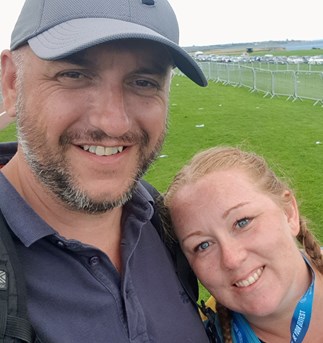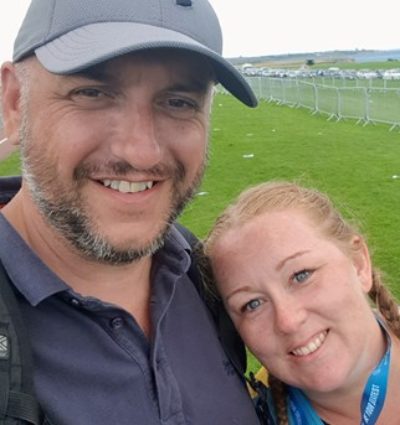



Dean’s experience of chemotherapy after surgery
Dean was diagnosed with an ampullary carcinoma when he was 41. He had the Whipple's procedure and is now sharing his experience of having chemotherapy after surgery
Chronicles of Chemotherapy
It’s been quite a while since my operation, more than 10 months, and the further I get from it, the further I want to get from it. You see, that means I’m still here, which means I’m still alive and cancer free. That’s how I look at things now; everything is a step towards some future point where I can begin to put this all behind me, or at least put it to one side. In reality, that future point may never come and I’m okay with that. I’m beginning to get used to having the spectre of cancer lurking in the corner of every room and seeping into my thoughts at some point during the day. It’s usually fleeting and they are becoming less often and less melancholy as I feel more like myself, fitter and more able.
All of this has come after chemotherapy. I had a brief interlude between the operation and chemotherapy commencing where I was really feeling gains in my overall well-being. Nothing remarkable, just progress. It almost feels, in hindsight, like my healing and progress was put on hold during my chemo treatment and that I’m back on track now it’s over.
My schedule began in early October and I was prescribed gemcitabine once a week via a drip and, as I’d agreed to be part of a trial, capecitabine tablets orally twice a day. I was very nervous about my first infusion of gemcitabine; I’d heard about all the side effects of any cancer drug and I was preparing myself for a hellish time afterwards. As it turned out, I felt very little from that first one, aside from lethargy and two or three days of haziness.
‘Chemo-fog’
That haziness was later described as “chemo-brain” or “chemo-fog”. The “fog” lifts after a few days, but was only noted by me after it cleared. It’s a strange thing. Focus and thinking about complex tasks becomes really difficult, so I now look back on pieces I’d written at work some months ago and realise how cognitively impaired I was. They’re pretty rubbish. If you’re reading this about to go through chemo and your job requires writing anything, you may want someone to check your work.
Month two and three were pretty much like the first month except the respite between sessions became less and less. The effects of the drugs stayed for longer and longer. Chemo-fog was lingering like a bad smell (if you’ve had the Whipple’s operation, you’ll be familiar with those). I began to feel less like going as the weeks went by. Month three was a hurdle to get over. It was a benchmark I’d created and, in my head, once I had done month three, I was heading downhill towards the finish line. Three down and three to go. On the home straight, as it were. Mind tricks almost work to keep you going, in the same sense that a runner will use lampposts as a marker to get to, then the next one and so on until you get to where you’re going.
Month four
When month four reared its head I was ready to stop. I’d hit the wall and felt washed out. I was a fleshy robot going through the motions of life in a vacant daze of grey thoughts and monochrome moments. It had begun to feel as though I was on a train track with a fixed end, unable to change direction or stop and get off. I wasn’t in control of anything; I simply did as I was told and turned up at the hospital when they said I should.
Then, I stopped. I was sat in the comfy(ish) chairs after having blood taken and just asked my nurse if I could miss a treatment if wanted to. I didn’t mean that one, at that moment, but that is what happened. She was incredibly understanding and told me that if I wanted to miss one, I could. I wouldn’t advise this or promote skipping a dose, but for me, at the time, it was right. I was full of chemo and it wasn’t receding anymore. I was being constantly topped up and was feeling depressed. It’s a strange kind of darkness that chemotherapy creates. It’s a chemical induced depression because, as the drugs eventually leave your system, you begin to see and feel your mood lift. My nurse rang me later that day and told me that my bloods weren’t right and that they would have skipped that session anyway, which made me feel better in a way. I had wanted, at the start of my chemotherapy, to do every session and make it to the end. In my head I thought that, if the cancer ever came back, it might be because I’d missed a session. A huge positive by-product of missing that session was that I was able to enjoy Christmas with my amazing wife and relatively oblivious kids.
My wonderful wife accompanied me to my chemo sessions, until I asked her not to. Not that I didn’t enjoy her company, just that it was a very long and boring day for both of us, and eventually I split it over two days; bloods on a Tuesday, then chemo on a Wednesday. Prior to this, I was there for six or seven hours while waiting for the results of my bloods and then the inevitable infusion of poison. Two short days were far better than one long one; and it helped with my job as I was able to feel like I was contributing still to the family pot, and also I needed it. It kept me useful (though my colleagues may argue otherwise).
My parents would meet me at the hospital as much as they could and it was nice to have the company, but weirdly, I was okay on my own. You think you need company for these things, but honestly, I was okay on my own. I think I preferred it at times. On my own I was able to be quiet and not focus on a conversation. On my own I didn’t worry that my wife or parents were sitting hours on end trying fruitlessly to fill their time or mine.
Finishing chemotherapy
Month five and six were by far the most difficult to endure; mostly from a mental perspective. I was mentally drained all of the time. I felt and looked grey. Black crescents were a permanent feature under my eyes and I was suffering from class 3 fatigue. I don’t really know what that means, aside from really tired. Every trip to the hospital was an effort; I’ve never not wanted to do something so much in my life, and still went ahead and done it. Pride got me through; that and not wanting to die or let my family down. Then, I was done.
Done and finished were words that were quietly tinged with “for now”, but less so as the weeks have gone by. I am more optimistic than perhaps I should be, but I feel pretty bloody good, all things considered. I am close to where I was physically before the word cancer crept into our lives. I still have abdominal tightness at all times and twinges that appear from nowhere. I have, the much talked about on Whipple forums, Whipple attacks from time to time, but they too seem to be becoming less often.
All in all, I’m here. I’m getting much better. I’m still here.
October 2018
Read more of Dean’s story and his experience of surgery

